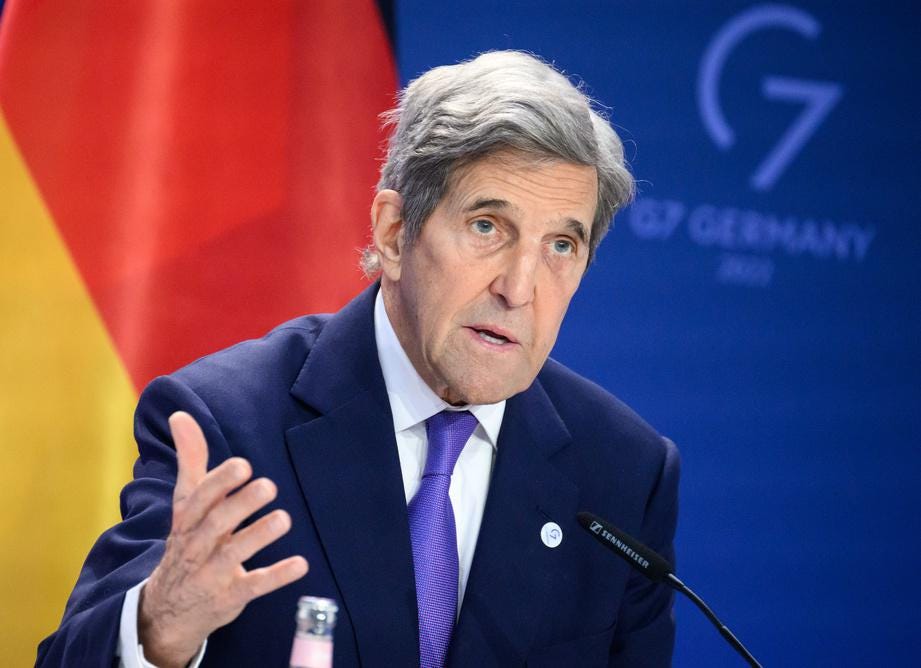Asia Editors’ Pick The Rise Of The G7 And The Decoupling Of Global Governance Vasuki Shastry Contributor Opinions expressed by Forbes Contributors are their own. I write about Asian economics and technology news. New! Follow this author to improve your content experience.
Got it! Jun 23, 2022, 08:45pm EDT | Share to Facebook Share to Twitter Share to Linkedin John Kerry, the U. S. President’s Special Envoy for Climate, speaks at a press conference at the .
. . [+] meeting of G7 Ministers for Climate, Energy and Environment on the establishment of a climate and energy partnership between the United States of America and Germany.
The ministers met at the EUREF campus in Berlin-Schöneberg as part of Germany’s G7 presidency. Bernd von Jutrczenka/picture alliance via Getty Images There was a time when the Group of Seven (G7), the assembly of wealthy nations, was consigned to the footnote of global governance. This was in the aftermath of the 2008 global financial crisis when a larger peer group, the G20, became all powerful as the policy coordinator for the global economy.
The tide has turned since Russia’s invasion of Ukraine, unsettling and reordering the nodes of geopolitics. As G7 leaders gather early next week in the Bavarian Alps for their annual summit, it is no exaggeration to note that decisions taken at the Schloss Elmau resort will have far-reaching implications for the global economy. To be sure, the G20 has not disappeared as the primary platform for global economic policy.
Russia’s invasion, however, has exposed the group as being sharply divided. Large emerging countries, China notably, but also India, Brazil, South Africa, and Indonesia have taken a neutral position on the conflict. Their stance is typified by Indian Foreign Minister S.
Jaishankar who recently said that the Ukraine crisis is Europe’s to resolve. “Europe has to grow out of the mindset that Europe’s problems are the world’s problems but the world’s problems are not Europe’s problems,” Jaishankar said. The stance of emerging nations has had an immediate, tangible impact on the G20.
While the bureaucratic apparatus of the group remains intact, with 2022 host nation Indonesia scheduled to handover to India next year, it is obvious that Russia’s continued participation makes it impossible for the group to get anything substantive done. In April, at a meeting of G20 finance ministers in Washington, U. S.
Treasury Secretary Janet Yellen and a group of European ministers walked out when the Russian finance minister started speaking. To add to this combustible mix is China. The Biden administration and its European and Asian partners are attempting to build a global coalition to counter Beijing’s meteoric economic rise and power projection.
Russia’s invasion of Ukraine and Beijing’s evident support of it has given the G7 an opportunity to use its opposition to Russia’s invasion, which dates back to Moscow’s illegal acquisition of Crimea in 2014 and subsequent ejection from the G8, to also counter China. MORE FOR YOU China Detains Fallen HNA Ex-Billionaire Chairman Ahead Of Airline Restructuring Vote Nasdaq Listing Of Freshworks Creates Windfall For Indian Founder And Hundreds Of Employees Ninja Van Becomes Singapore’s Newest Unicorn After Raising $578 Million From Alibaba, B Capital President of France Emmanuel Macron shakes hands with Ukrainian President Volodymyr Zelensky (C,L) . .
. [+] flanked by Prime minister of Italy Mario Draghi (L) and Chancellor of Germany Olaf Scholz (R) in Mariinsky Palace, in Kyiv, on June 16, 2022. SERGEI SUPINSKY/AFP via Getty Images After imposing unprecedented economic sanctions against Russia, the G7 is now moving on to its pre-2008 role as the committee to coordinate the global economy.
At their upcoming summit, leaders are scheduled to discuss policy issues that were once the preserve of the much larger G20. These includes shaping the global economy, promoting partnerships for infrastructure and investment, food security, and investing in a better future with a focus on climate, energy, and health. The invited participation of leaders from India, Indonesia, Argentina, South Africa, and Senegal in the summit, to begin on Sunday, will lend credibility to G7’s assertion that it is indeed making efforts to be representative of the global economy.
The group has also floated a proposal to launch a “climate club,” which will bring together developed nations with a group of developing countries to originate and innovate climate solutions. America’s own recent efforts in the Asia Pacific region, where it has launched an Indo-Pacific Economic Framework (IPEF) with 14 nations (Fiji is the latest to sign up), is clearly an attempt to build regional and global coalitions aimed at countering China. There is a risk of course that the G7 may over-reach and the defenestration of the G20 will lead to an inevitable decoupling of global governance.
At a time of great uncertainties for the global economy, the best investment the G7 could make is to preserve the representative nature of the world order that it built from the ruins of the global financial crisis. Vasuki Shastry Editorial Standards Print Reprints & Permissions.
From: forbes
URL: https://www.forbes.com/sites/vasukishastry/2022/06/23/the-rise-of-the-g7-and-the-decoupling-of-global-governance/



